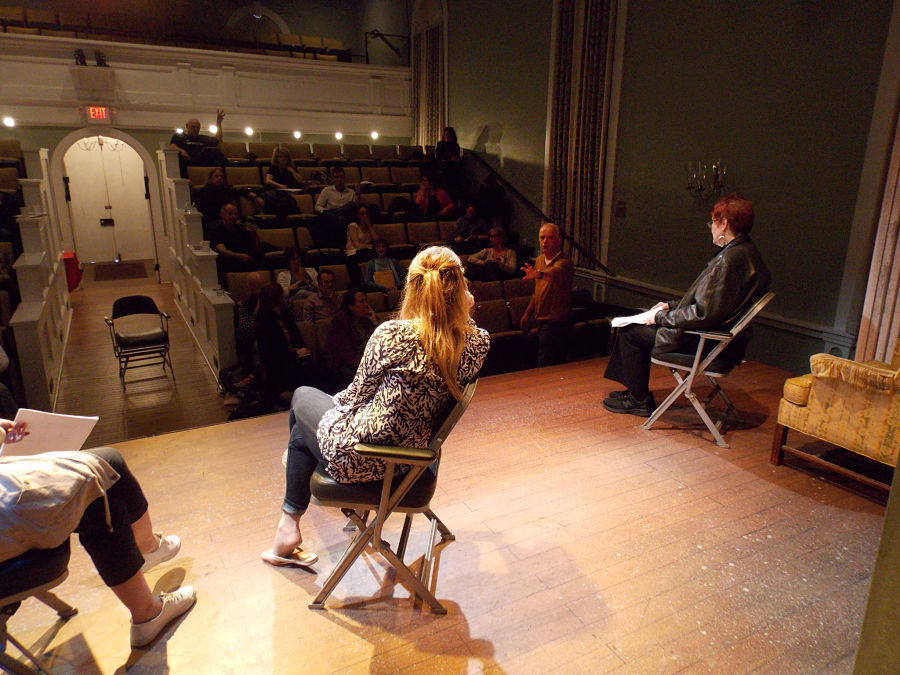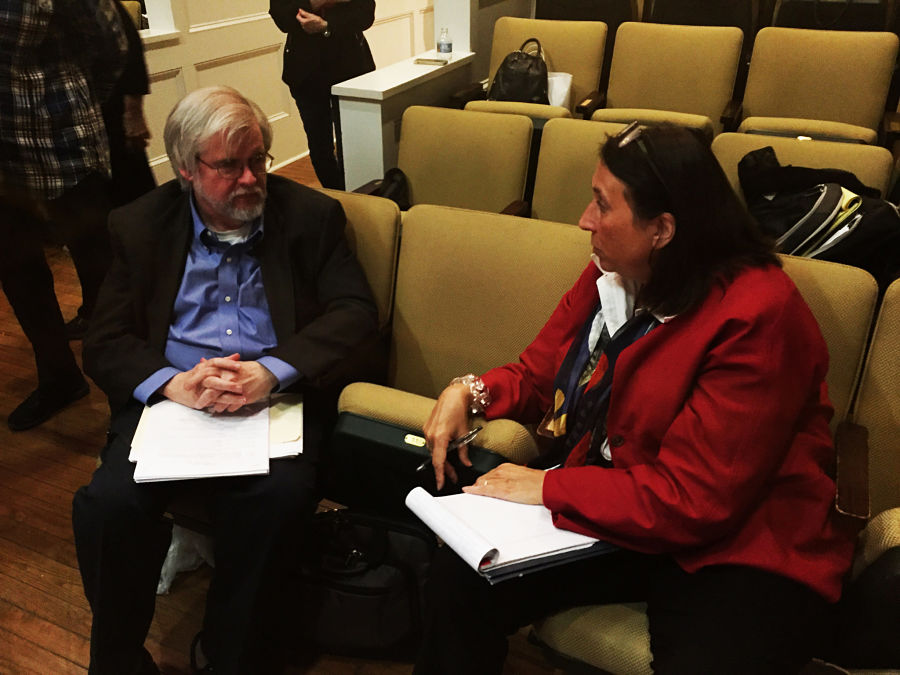Steven Dietz sat with his legs dangling and ankles crossed on the edge of the stage. Behind the playwright stood an unfinished, war-torn, water-stained antebellum mansion—the set for Matthew Lopez’s The Whipping Man, which opens the 2016 season at Cape May Stage. Twenty young, emerging, and mid-career playwrights faced Dietz from the audience.
“We need your plays,” he told them. “The American theatre is hungry! It’s not full.”
Dietz, a prolific writer with 30-plus plays to his name, had spent the morning outlining techniques that playwrights could keep in what he called their “literary toolbox.” After that, he had led a lively back-and-forth with participants, who ranged in age from their early 20s to older than 70. For the rest of the day, Dietz watched short plays and scenes created by each participant in response to a writing exercise he’d given them, performed by professional actors.
The occasion was the National Playwrights Symposium at Cape May Stage, which took place May 16-19. The theatre’s producing artistic director, Roy Steinberg, and playwright and set designer Shawn Fisher began the program in 2013 as a seminar and workshop where participants can work with and learn from award-winning writers. The program is set against the backdrop of a quaint Victorian island resort on the southernmost tip of New Jersey. (Just past Exit 0 on the Garden State Parkway.)
Besides Dietz, this year’s master playwrights were Christopher Durang, Joshua Harmon, and Mark St. Germain. Past participants include Stephen Adly Guirgis, William Mastrosimone, Lee Blessing, John Pielmeier, Terrence McNally, Amy Herzog, Ken Ludwig, Israel Horovitz, Nicky Silver, David Ives, Halley Feiffer, and David Auburn.
“We wanted to create a beacon, a place where writers could find inspiration, and where master playwrights would want to come to visit,” said Fisher. “There is this notion that a writer’s life is lonely, but theatre is a collaborative art form and the idea that you develop plays on your own is not practical. So the idea of sharing your ideas, sharing new work, and getting feedback from colleagues and from master playwrights is something we wanted to facilitate.”
The formal sessions began at 9 a.m. and concluded at 4:30 p.m., and outside of that time, participants could schedule one-on-one sessions with the master playwrights and exchange ideas over dinner. “In the evening, we have informal gatherings—often late into the night—which are my favorite part,” said Fisher.
Participants paid $595 for the week’s tuition, with Cape May Stage arranging discounted rates at an oceanside hotel during their stay. Master playwrights received an honorarium for their stint, usually much less than their standard speaking fees.
The idea for an annual symposium grew out of Steinberg’s contacts with writers, which he had developed over the years as an actor and director in New York and Los Angeles, and at the Yale School of Drama. He met Fisher in 2009, just after he joined Cape May, while producing Auburn’s Proof at the theatre, and Fisher was brought in to design the set.
“We said, ‘Let’s bring in people we really admire and give aspiring writers some opportunity to meet with luminary playwrights,’” said Steinberg. “It wasn’t our intent, but eventually a nucleus, a group was formed, and many of our participants come back every year.”
Kelly McCarthy, a playwright and former journalist, said that she was attending the symposium for the third time. In September, her first full-length play, The King of East Jabip, will have a four-week run at the Eagle Theatre in Hammonton, N.J. “It’s wonderful,” she said. “You learn from the master playwrights, from hearing your work read out loud, and from your peers.”
Another returnee was Margaret Engel, an investigative journalist and head of the Alicia Patterson Foundation in Washington, D.C. Her play Red Hot Patriot: The Kick-Ass Wit of Molly Ivins, which she wrote with her sister Allison Engel, toured nationally with Kathleen Turner starring as Ivins, and in 2015 opened the season at Cape May Stage. “The beauty of this symposium is not just the community it creates, but it is a crash course in how to write plays,” she said. “For those of us who never went to drama school, it is so helpful that these esteemed playwrights are so specific about what works, how to analyze plays, their tone and shape and structure.”
Steinberg says that the feedback he gets from the playwrights who’ve led past symposiums has been enthusiastic. After Silver participated, he wrote on Facebook: “It was exhausting, but I am so glad I went! I feel as if I made 40 new friends!…More important than any crumb of information, inspiration, or direction that might have been offered, what they are doing is creating a family of artists, which is a rare thing in the venom-infused, scorpion-infested world of the theatre.”
Catherine Frels, a New York-based actress who will play Olivia in Laura Eason’s Sex With Strangers at Cape May this season, helped lead many of the readings at the symposium, “What’s really exciting about the symposium, as a woman, is seeing so many female participants,” she said, “because there’s just not enough work written for women, and they’re writing really terrific scenes and plays about women who are doing important things.”

At this year’s event, St. Germain kicked off the week on Monday by reading from a new work, tentatively called either The Surrogate or Wednesday’s Child. It was the first time he’d ever read the play aloud, and afterward he asked the participants for feedback, which led to an intricate discussion of motive, character, relationship issues, logic, continuity, and many other practical details. For the rest of the day, St. Germain responded to more than a dozen of the participant’s pieces, which were read by actors. Each writer was asked to prepare a letter from a character in one of their plays to another character that had been “written many years after the time of the play.”
On Tuesday, Harmon led a discussion about A Streetcar Named Desire. “He created such a safe environment that everyone was enjoying it and asking lots of questions,” said Fisher of the workshop. On Wednesday, Dietz led the sessions, and the event wrapped up on Thursday with Durang reading from several of his works and presenting the participants with what he called “semi-rules”—i.e., guidelines that are often valuable but don’t always need to be followed exactly.
“I feel like there isn’t anything that you have to do, like, ‘All good plays have only one protagonist,’” Durang explained. “I really don’t think about rules so much. But playwrights—particularly beginning playwrights—like more scientific things. My partner at Juilliard [in the playwrights program], Marsha Norman, is more analytical, and she has a lot of interesting things to say, and I guess I’ve picked up on some of that.”
Outside in the courtyard of Cape May Stage’s 1853 playhouse, Dietz reflected on the event. “It’s a bit of a boot camp,” he said, adding that he liked that the participants had different points of view from the four master playwrights. “As a teacher, I have no interest in producing writers who write like me.”


